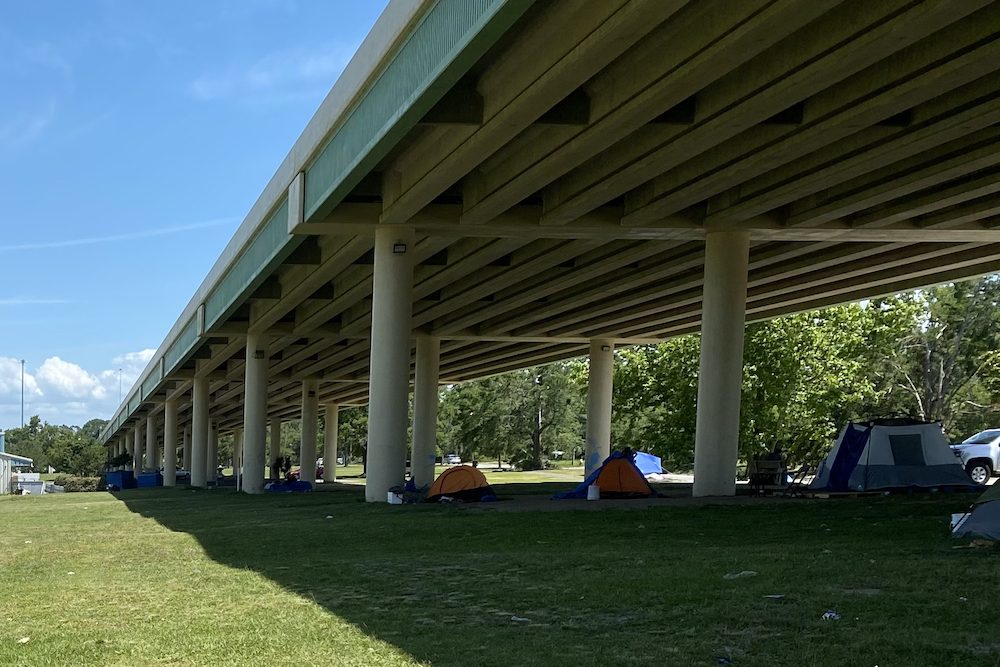City Unveils New Report, Task Force
by Jeremy Morrison
The Pensacola City Council will be focusing on the issue of homelessness this week, with a special workshop on the subject Monday. During the workshop, Dr. Robert Marbut — who served as former president Donald Trump’s homeless czar and is currently a consultant for the city — will present a report detailing potential remedies to the issues surrounding homelessness.
In the temporarily sanctioned homeless encampment beneath a stretch of I-110 overpasses near downtown, you’re not likely to find a lot of fans of Dr. Marbut.
“Personally, I think he’s speaking out the wrong end,†said Thomas Van Pelt, who volunteers with the Alfred Washburn Center and is also actively engaged with the I-110 community.
Marbut has long attracted critics, who cite his penchant for using punitive ordinances to address the issue of homelessness.
“Anybody that’s ever done any research of Dr. Marbut knows what he’s going to say,†said Mike Kimberl, executive director of the Washbrun. “He’s an advocate of criminalizing homelessness. He doesn’t call it that. He calls it giving officers the tools they need to get the homeless the help they need.â€
The consultant has also taken some heat for his suggestion that money should not be given to people panhandling, because they will only use it to purchase alcohol or drugs or sex. District 5 City Councilwoman Teniade Broughton scolded Marbut following a preview of his report during a meeting last week for implying that homeless people were crack addicts
“The comment about crack out the window was insensitive,†Broughton told the consultant. “We don’t want to label people who panhandle as crackheads.â€
Down at the I-110 encampment, Tim Arney agrees.
““It’s offensive,†he said.
Arney — who is currently living in his car in the encampment and also going to be sitting on a subcommittee of the newly formed Homeless Reduction Task Force of Northwest Florida — pointed out that many of his fellow campers are actually employed, yet lack shelter.
“Probably 40 percent of this community have jobs,†agreed Van Pelt.
Looking around the encampment, Van Pelt explains that some people that panhandle have real needs that they’re trying to meet. Like food. Or medicine. And each of these people have their own individual circumstances and needs, weaknesses and strengths.
“There’s a veteran, he fought for us,†the volunteer said, pointing to a man sitting on a nearby bench. “They’re not all alcoholics and crack addicts.â€
In order to best serve this population, Van Pelt said, it’s necessary to connect with them on a personal level, to help each along their individual path out of homelessness.
“There’s a hundred different problems here and there’s going to be a hundred different solutions,†he said.
During Marbut’s presentation to city council, in tandem with the unveiling of the new task force — being headed up by John Johnson of Open Doors of Northwest Florida and Connie Bookman of Pathways for Change — a few of those potential solutions will be discussed.
Among the recommendations being outlined by Marbut are the creation of a “holistic service center,†basically a hub for providers to connect with individuals, as well as a nearby kitchen complex for centralized food distribution; a focus on creating additional low-cost housing units; tweaking a database used for case management purposes so that it functions in a more networked, real-time manner; and securing an ongoing source of funding within both the city and county budgets for the purpose of addressing the needs of the homeless community.
Notably absent from Marbut’s report is any direction to establish ordinances aimed at activities associated with being homeless, such as sleeping outside in a public park. In fact, citing still unsettled court cases concerning the ability to address the issue with punitive measures while being unable to offer available shelter space — which the region sorely lacks — Marbut suggests local governments avoid any legal entanglements: “It is much better to fund high performing agencies than it would be to pay lawyers to defend a murky case.â€
This isn’t very surprising to folks like Kimbrel. He understands that’s likely why the city is letting the encampment sit for the time being, why city council has granted moratoriums on removing people from the encampment.
“It became very evident very quick that we’re not going to move all these people out from under this bridge in 90 days, so they extended it 90 days,†Kimbrel said. “And I’ll bet they’ll extend it another 90 days.â€
The I-110 encampment’s population has been slowly increasing as of late. Walter Arrington, a University of West Florida social work student who is overseeing the I-110 encampment, said this is probably because people have begun to identify it as a safe space.
“We’re seeing a lot more single ladies show up, we’re seeing a lot more elderly show up,†he pointed out. “They’re needs to be a place for them, where they can feel safe.â€
Arrington use to be homeless himself, and he’s hopeful that the current discussions going on within the halls of local government will prove beneficial: “I feel like we’re about to do something amazing.â€
“We’re always going to have this population†Arrington pointed out. “The goal is to figure out a way to deal with this issue without it getting crazy.â€
Pointing to the current crop of local elected officials, particularly on city council, which saw a healthy turnover last November, Van Pelt said he thinks the time could be ripe for some progress on this issue.
“There’s a pathway forward if they can reach the right people,†the volunteer said.
— To read more about local efforts to address the issues surrounding homelessness, check out this week’s issue of Inweekly.
